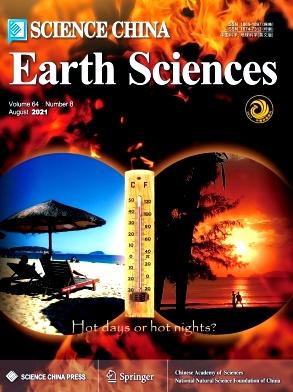东特提斯构造域变质演化及其构造意义
摘要
中国中部造山系在中国中部呈东西向延伸,西为早古生代阿尔金—北祁连—北柴达木—东昆仑—北秦岭—北桐柏造山带,东为晚古生代至早中生代南桐柏—红安—大别—苏鲁造山带。它们分别产生于原特提斯洋和古特提斯洋闭合期间的大洋俯冲和大陆俯冲/碰撞。这些造山带广泛出露不同类型、不同年龄的变质岩,它们产生于收敛大陆边缘构造演化不同阶段的不同地温梯度,是重建东特提斯构造域时空演化的理想对象。本文综合研究了沿CCOS变质岩的变质温度(T)-压力(P)-时间(T)记录,旨在确定变质温度/温度比值在时间和空间上的变化,进而揭示东特提斯构造域的构造演化与收敛大陆边缘热状态变化的联系。结果表明,不同造山带的变质岩虽然变质年龄不同,但其变质岩均呈现顺时针P-T-t路径的共同趋势。根据板块汇聚作用的俯冲碰撞作用,将区域变质作用划分为3个阶段:(1)早期汇聚作用阶段,对应于低T/P高山型蓝片岩-榴辉岩相高P -超高P变质作用;(2)后期辐合阶段,对应于中T/P巴罗维斯型中P角闪岩向高P麻粒岩相变质作用;(3)后辐合期,对应于高T/P布坎县型低P角闪岩向MP麻粒岩相变质作用。然而,少数变质岩只记录了两期变质演化,即早期barrovan型高磷麻粒岩相变质作用和晚期buchan型低磷麻粒岩相变质叠印作用。在现代辐合板块边缘,阿尔卑斯型变质作用主要发生在大洋俯冲和大陆碰撞阶段,巴罗维亚型变质作用主要发生在大陆硬碰撞时期的地壳增厚阶段和大陆俯冲带由挤压向伸展演化阶段的板块拆出阶段,布坎安型变质作用主要发生在板块辐合后的陆内裂陷阶段。因此,结合变质T/P比值及其对应的变质相系和变质岩的变质时间,可以重建收敛性大陆边缘的构造演化。根据已报道的沿CCOS不同类型和年龄的变质岩,认为阿尔金-北秦岭-北桐柏造山带的大陆俯冲/碰撞发生在500 ~ 490 Ma,而柴达木-东昆仑造山带的大陆俯冲/碰撞发生在450 ~ 430 Ma;阿尔金-北秦岭-北桐柏造山带的大陆内裂陷发生在460 ~ 450 Ma,而柴达木-东昆仑造山带的大陆内裂陷发生在410 ~ 400 Ma,分别发生在西部原特提斯域。古特提斯东域的大陆俯冲/碰撞发生在250 ~ 220 Ma,碰撞后的陆内裂陷发生在140 ~ 120 Ma。此外,从俯冲/碰撞阶段的低T/P比到陆内裂陷阶段的高T/P比的变质演化,在原特提斯域需要40-60 Myr,而在古特提斯域大约需要110 Myr。因此,对于两个不同的造山域,辐合大陆边缘经历了从暖碰撞/冷俯冲到热裂陷的共同构造演化,从大陆俯冲/碰撞开始,形成中磷角闪岩-高磷麻粒岩相系列或挤压状态下高磷-超高磷榴辉岩相系列,通过深俯冲地壳岩石的掘出;止于伸展状态下以高t至超高t麻粒岩相系列为特征的陆内裂陷作用。The China Central Orogenic System (CCOS), extending in an east-west direction in the middle part of China, is composed of the Early Paleozoic Altyn-North Qilian-North Qaidam-East Kunlun-North Qinling-North Tongbai orogens in the west and the Late Paleozoic to Early Mesozoic South Tongbai-Hong’an-Dabie-Sulu orogens in the east. They were produced by oceanic subduction and continental subduction/collision during the closure of the Proto-Tethys and the Paleo-Tethys oceans, respectively. Different types of metamorphic rocks with various ages are extensively exposed in these orogens, and they were produced at different geothermal gradients in different stages during the tectonic evolution of convergent continental margins, making them ideal targets to reconstruct the spatiotemporal evolution of the Eastern Tethys tectonic domain. In this article, an integrated study of metamorphic temperature (T)-pressure (P)-time (t) records is presented for metamorphic rocks along the CCOS, aiming to ascertain the change of metamorphic T/P ratios in both time and space, and then shed light on the tectonic evolution of the East Tethys tectonic domain in association with the thermal state change of convergent continental margins. The results indicate that despite the difference in metamorphic ages, metamorphic rocks in different orogens show a common trend with clockwise P-T-t paths. With respect to plate convergence for subduction and collision, regional metamorphism is categorized into three stages: (1) an early convergent stage, corresponding to low T/P Alpine-type blueschist- to eclogite-facies high-P to ultrahigh-P metamorphism; (2) a later convergent stage, corresponding to the medium T/P Barrovian-type medium-P amphibolite to high-P granulite-facies metamorphism; and (3) a post-convergent stage, corresponding to the high T/P Buchan-type low-P amphibolite to MP granulite-facies metamorphism. Nonetheless, a few metamorphic rocks only record a two-sage metamorphic evolution, with an early Barrovian-type high-P granulite-facies metamorphism and a late Buchan-type low-P granulite-facies metamorphic overprinting. In modern convergent plate margins, Alpine-type metamorphism mainly occurs in the stages of oceanic subduction and continental collision, Barrovian-type metamorphism takes pace in both stages of crustal thickening during continental hard collision and slab exhumation when continental subduction zones have evolved from compressional to extensional regimes, and Buchan-type metamorphism occurs in intracontinental rifting stage after the plate convergence. Therefore, the tectonic evolution of convergent continental margins can be reconstructed by combining metamorphic T/P ratios with their corresponding metamorphic facies series and metamorphic timing of metamorphic rocks. Based on the reported metamorphic rocks of different types and ages along the CCOS, it appears that the continental subduction/collision occurred at 500–490 Ma in the Altyn-North Qinling-North Tongbai orogens but 450–430 Ma in the North Qaidam-East Kunlun orogens, and the intracontinental rifting occurred at 460–450 Ma in the Altyn-North Qinling-North Tongbai orogens but 410–400 Ma in the North Qaidam-East Kunlun orogens, respectively, in the western Proto-Tethys domain. For the eastern Paleo-Tethys domain, in contrast, the continental subduction/collision occurred at 250–220 Ma and post-collisional intracontinental rifting occurred at 140–120 Ma. Furthermore, metamorphic evolution from low T/P ratios in the subduction/collision stage to high T/P ratios in the intracontinental rifting stage needs 40–60 Myr in the Proto-Tethys domain but about 110 Myr in the Paleo-Tethys domain. For the two different orogenic domains, therefore, the convergent continental margins underwent a common tectonic evolution from warm collision/cold subduction to hot rifting, which starts from continental subduction/collision characterized by the formation of medium-P amphibolite to high-P granulite facies series or high-P to ultrahigh-P eclogite facies series in compressional regimes, through exhumation of the deeply subducted crustal rocks, and terminates with intracontinental rifting featured by high-T to ultrahigh-T granulite facies series in extensional regimes.

 求助内容:
求助内容: 应助结果提醒方式:
应助结果提醒方式:


